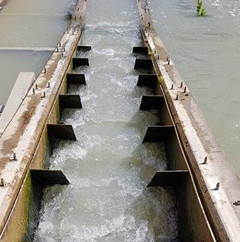|
|
Denil fishwayDenil fishway – Key considerations Select from the tabs below In addition to the general information for all fishway types, the following applies to Denil fishways. Requirements for effective passageIn Australia, passage of small fish (<120 mm long) through Denil fishways has been poor unless the fishway is at a relatively low slope (1:12 vertical:horizontal or flatter) compared with the usual steep slopes of 1:4 to 1:7 used in other countries[1][2]. For this reason, Denil fishways tend to be used in combination with a vertical slot or fish lock fishway where there is a clear need to service a separate ecological and hydraulic function. For example, at Wentworth Weir on the Murray River, a vertical slot fishway services small- to large-bodied fish at low and medium flows, and a Denil fishway with a high discharge and a wide channel width services large Murray cod migrating at high flows[4]. Suitability and limitationsDenil fishways discharge relatively high volumes of water. The large flow associated with the Denil design reduces the deposition of sediment within the fishway and provides good attraction capability, assisting the fish in finding the fishway however, water supply and usage can be a constraint for choosing Denil fishways in Queensland. There are presently no successful or functional Denil fishways in Queensland. An example of a poorly-designed and non-functional Denil fishway is located on the Luscombe Weir on the Albert River, which has head losses between pools, velocities and turbulences much greater than local fish communities are capable of passing through on a regular basis[3]. Examples of Denil fishways in Australia are on the Tweed (Bray Park Weir) and Richmond (Jabour Weir) rivers in northern New South Wales, and on the Murray River and in southern New South Wales (e.g. Euston Weir, Wentworth Weir, Mildura Weir, Gulpa Creek, Edward River, Koondrook-Pericoota floodplain, and the Torrumbarry weir pool)[5][4]. Disclaimer: In addition to the standard disclaimer located at the bottom of the page, please note the Fishways (biopassage structures) disclaimer. References
Last updated: 10 May 2021 This page should be cited as: Department of Environment, Science and Innovation, Queensland (2021) Denil fishway – Key considerations, WetlandInfo website, accessed 8 May 2025. Available at: https://wetlandinfo.des.qld.gov.au/wetlands/management/fish-passage/technologies/fishway-options/denil/key-considerations.html |

 — Department of the Environment, Tourism, Science and Innovation
— Department of the Environment, Tourism, Science and Innovation

